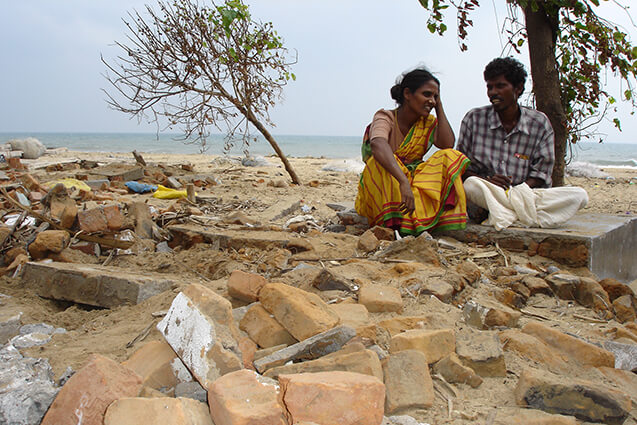Thinking about my work in ActionAid India’s humanitarian interventions and my mind is filled with the image of Ammu Kannu.
Ammu Kannu is an Irula tribal woman. She was married as a child. Her husband and she were engaged in inland fishing. They used to catch shrimp in the backwaters in Chidambaram block of Cuddalore district in Tamil Nadu. The block has good patch of mangroves. These mangroves protected large areas of coastal land. When the Tsunami waves struck in the morning of 26 December 2004, Ammu and her husband were caught in the waves. Ammu’s husband was with his kattumaram (country canoe), but the wrath of waves was too strong. Ammu saw him bein overcome by the waves. Ammu was pushed against thorny bushes by the waves but she survived. She lay in the bushes for an hour or more till the water subsided. When she returned to her hamlet, she saw nothing of the makeshift shacks that most Irulas lived in (kotte veedu). Her brother Srinivasan and his family were her refuge.
The loss of loved ones and the burden of survival can overwhelm anyone — it did not do so in case of Ammu Kannu. Ammu emerged as a proactive leader of the community. She personified the community spirit, teaching others of the importance of building collective solidarity and protecting the community’s rights over commons and ensuring in-situ housing of the community.
Community Solidarity
When I first met Ammu Kannu she was living in a make shift house — a shack. In 2006 the returning monsoon was so heavy that many parts of Chidambaram was under water for days. Floods affected large numbers of tsunami survivors who were awaiting housing. Ammu Kannu and about 100 families were living on land Bharathi Trust, an ally of ActionAid India, had mobilized from government. The situation was like a camp and there were more than 40 children in the camp.
Nearby 50 Irula families had been provided with permanent brick houses with reinforced concrete roofs. In Tamil Nadu, people ingeniously construct a canopy over terraced roofs (made from coconut frond and poles to hold them), to protect the house from direct sun in the scorching summer. The canopy provides additional space for household needs. While visiting this settlement I wondered whether the 100 families living in the camp could be accommodated under such canopies as a temporary solution.

Houses built as part of ActionAid’s Tsunami rehabilitation efforts for affected families
Houses built as part of ActionAid’s Tsunami rehabilitation efforts for affected families
I put the idea as a suggestion to the community. Would people be willing to move on the terrace of these houses, and would the owners of the 50 houses allow us to construct canopies, so that families could stay protected for the next four months till houses could be built for them on the patch of land where they were currently camped?
Ammu Kannu in her dramatic manner said: Sir, we are Irula People (Irula Makkal). We are all related to each other by blood and clan. I will go house to house. I will call a meeting. I will persuade them.
Next day a meeting of community leaders was held in Mariayamma temple (a folk god of Irulas) and an agreement to build 50 canopies was made. Some canopies split into two to accommodate all families. From September to December 2006, 100 families lived secure lives free from threat of snakes, from rains and dampness.
Dealing with Conflict
Our interventions in emergency recovery efforts are very process driven. We consult with the community to ensure transparency and accountability. In this particular situation perceptions arose that ActionAid India was delaying the construction. Faster delivery of houses was promised by another civil society intervention and 20 families joined this initiative. These families moved their shacks to a patch of adjacent to the existing camp land. The road leading to the existing camp had this patch of land to one side and a canal to the other side. The land on which the 20 families settled was usufruct or common land (parambok), and the some of the families sought to take in the road into their settlements, blocking access to the existing camp and land allotted to the 100 families.
Trucks carrying housing material for the construction on the original land allotted were stopped. Though I felt no tensions with either group, I knew that the conflict in the community was best handled by the community itself. Again Ammu Kannu came to the fore. She took up the matter to the District Collector, and was able to get a letter that the land was usufruct land and the community had right for common use. After solving the legal aspect of the conflict, the social impact of the conflict had to be addressed. Ammu Kannu with traditional leaders and youth from the community called for a meeting with 20 families and shared that the land issue is solved by the government, however, community feeling is to be addressed by the community, that was hitherto bound by community feeling. It was decided no wall between the two settlements was to be built. Instead a rainwater drain was dug between the two settlements.
The original settlement was called Cecil Nagar – named after Cecil Jackson Cole, the founder of ActionAid. Cecil Nagar came up at least 8 months before the houses of the other settlement. In the community feast on the establishment of Cecil Nagar all the 100 families came together and celebrated.
 Author: Ravi S K
Author: Ravi S K





